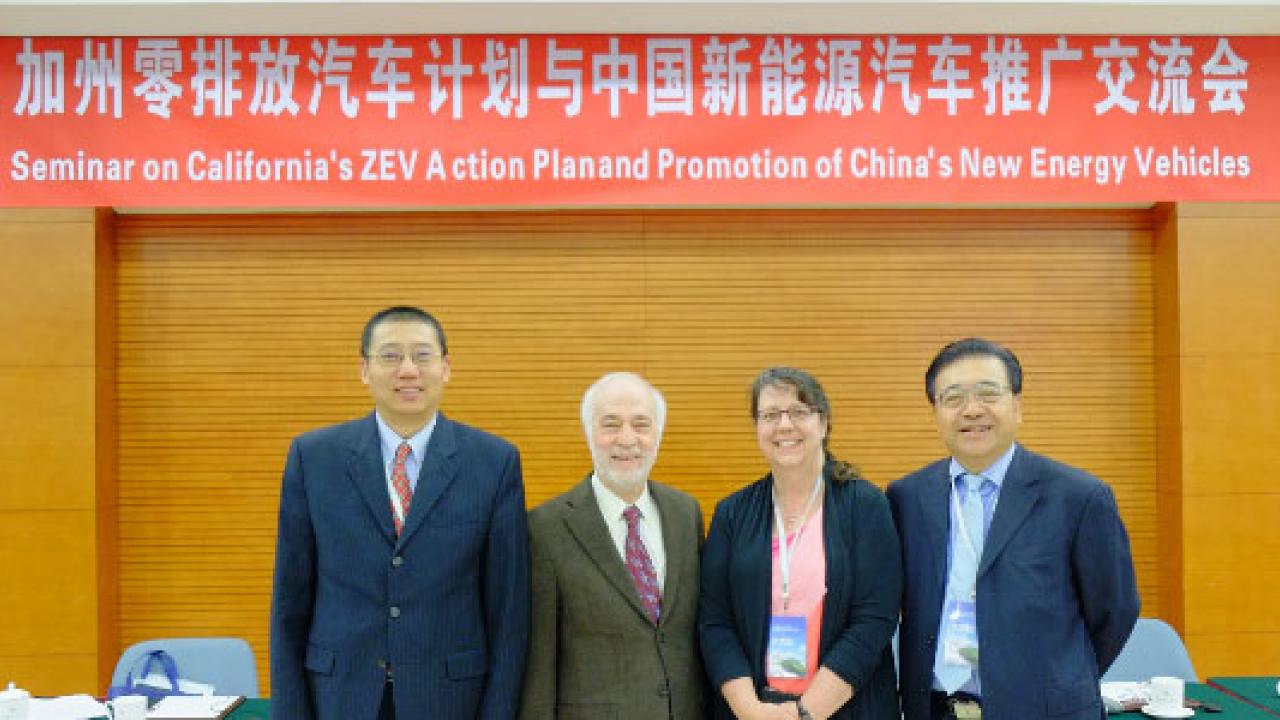
Relationships and History of Engagement Build Strong China Center Foundation
The Davis China Center for Energy and Transportation (C-CET) officially launched in 2007, and has grown to become the only research center of its kind in the United States focused on China’s transportation and energy policy nexus. Several years earlier, however, researchers from the UC Davis Institute of Transportation Studies (ITS-Davis) were exploring China’s evolving issues and participating in meetings with Chinese academics and government officials. These early interactions cemented the longstanding relationships at the core of today’s cross-cultural exchange.
“At first, we simply wanted to understand what is going on in China’s transportation- energy sector and collaborate with Chinese researchers,” explained C-CET Director Yunshi Wang. “In the process, we found out that we have much more to offer,” thanks to California’s experience in sustainable transportation.
In 2001 a team of ITS-Davis researchers published a paper on China’s unique transportation challenges as part of a series of case studies for the Pew Center on Global Climate Change:
“Transportation in Developing Countries: Greenhouse Gas Scenarios for Shanghai, China” Hongchang Zhou, Daniel Sperling, Mark A. Delucchi, and Deborah Salon.
In 2005, a delegation from China visited ITS-Davis in August. Then in October of that year, the president of the University of California system traveled to China to kick off a joint research relationship. The UC delegation visited Tongji University in Shanghai, where student researchers Jonathan Weinert and Jason Ni of ITS-Davis were studying motorization and alternative fuel use in the City of Shanghai.
Also in 2005, ITS-Davis Founding Director Dan Sperling traveled to Tsinghua University in Beijing for meetings with leading vehicle engineering researchers on the State Key Laboratory of Automotive Safety and Energy.
In 2007, on another trip to China, Sperling spoke about California’s early commitment to develop a Low Carbon Fuel Standard.
The China Center’s activities kicked up a notch in 2009, when the U.S. Department of Energy’s Office of Policy and International Affairs invited ITS-Davis to provide student researchers for DOE-sponsored work involving China. Graduate students Jacob Teter and Geoff Morrison helped plan the first U.S.-China Electric Vehicle Forum, at which Sperling was a keynote speaker. Teter and Morrison also contributed to the development of a high-level strategy for clean energy collaboration between the two nations announced that fall during President Obama’s trip to China. Teter spent fall quarter as an exchange student at Tsinghua University in Beijing.
In 2010, Sperling, Wang and ITS-Davis Research Engineer Andrew Burke along with Michael Siminovitch of the campus’s California Lighting Technology Center, and then-California Energy Commissioner Jim Boyd, attended the China Low Carbon Forum in Shenzhen City.
During the forum, Sperling signed an agreement between ITS-Davis, Beijing University’s Environment and Energy College (Shenzhen campus), and Shenzhen City’s Nanshan District to cooperate on clean vehicle demonstrations and research. Shenzhen City was the first city in China to be designated as a low carbon city earlier that year. Nanshan District is a high-tech zone within Shenzhen City.
The California delegation stopped by BYD Motors to see first-hand the company’s progress in developing a plug-in hybrid electric vehicle (PHEV).
By 2014, the many meetings and discussions facilitated by Sperling, Wang and the UC Davis China Center had led to the collaboration announced in October 2014 as the China-U.S. ZEV Policy Lab.
Earlier in 2014, Sperling, Wang and representatives from the California Air Resources Board (ARB) traveled to China to finalize plans for the Policy Lab. They delved into the details of California’s ZEV regulation to help Chinese officials understand the scope of this state’s effort.
Now that the China-U.S. ZEV Policy Lab is up and running, C-CET Director Wang says he is already thinking of ways to broaden UC Davis’ collaboration with China beyond a simple focus on ZEVs to include broader sustainable transportation topics such as urban development and smart cities.
Stay tuned!
